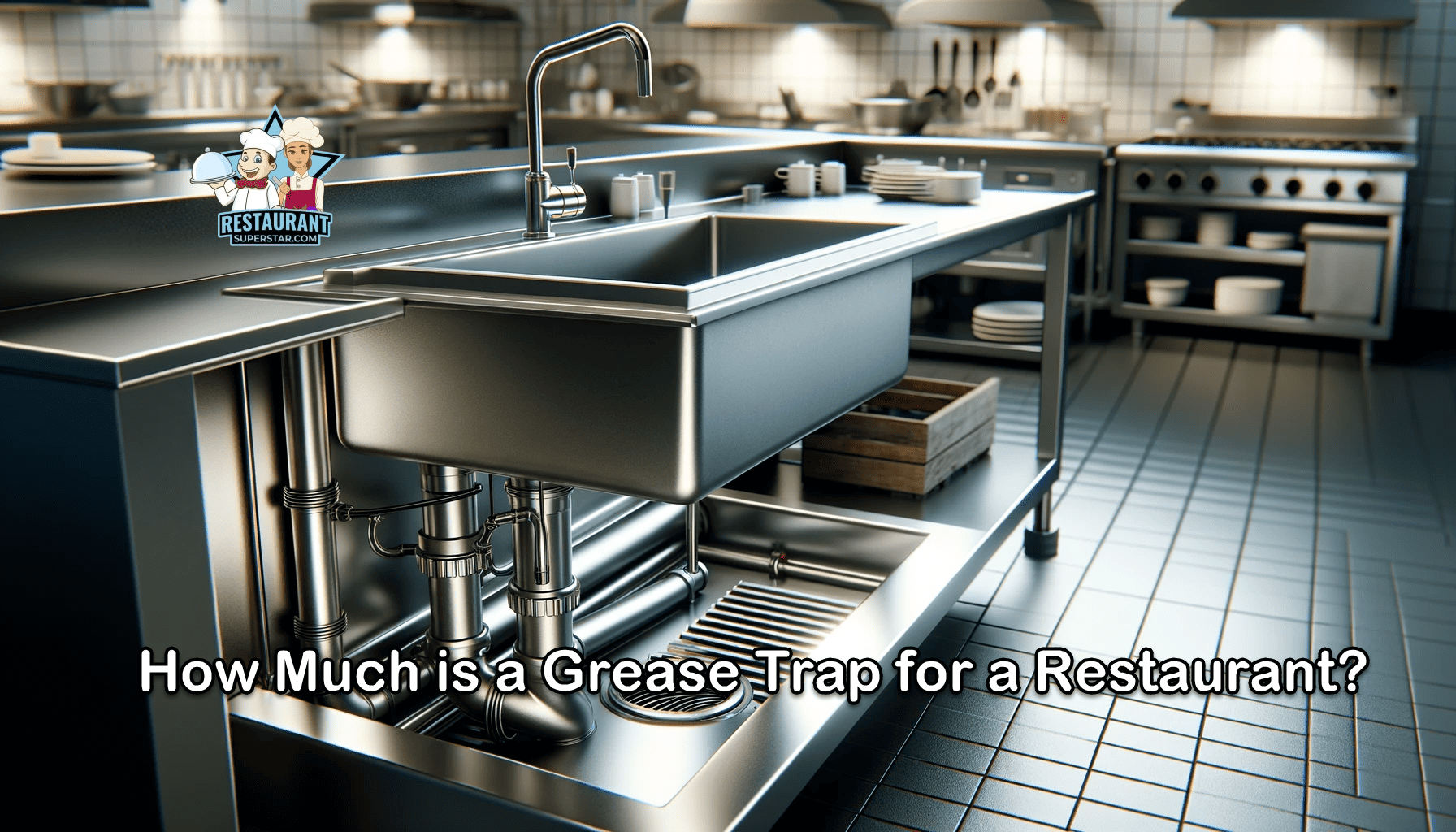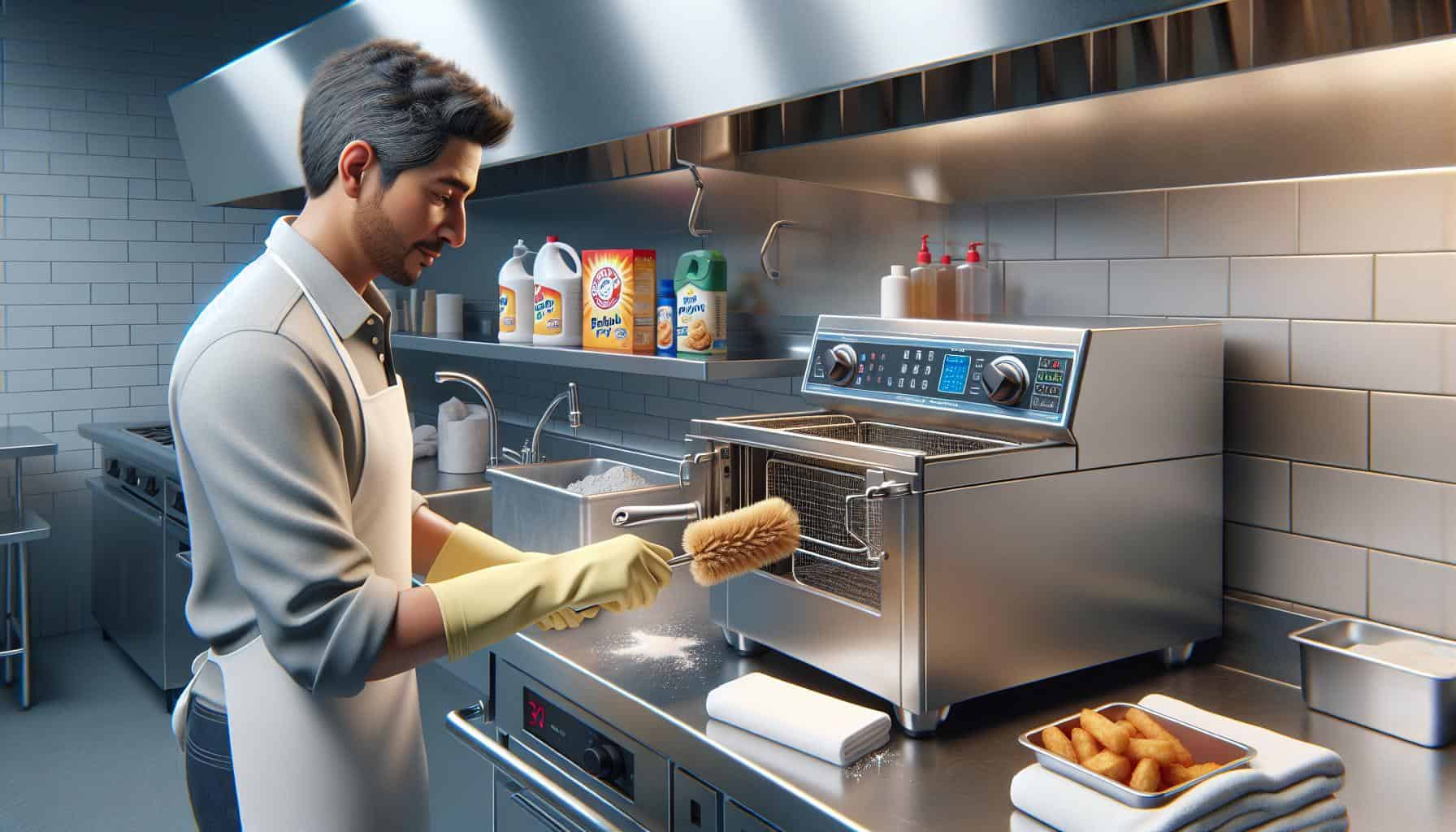What Does Expo Mean in a Restaurant -Latest Update!
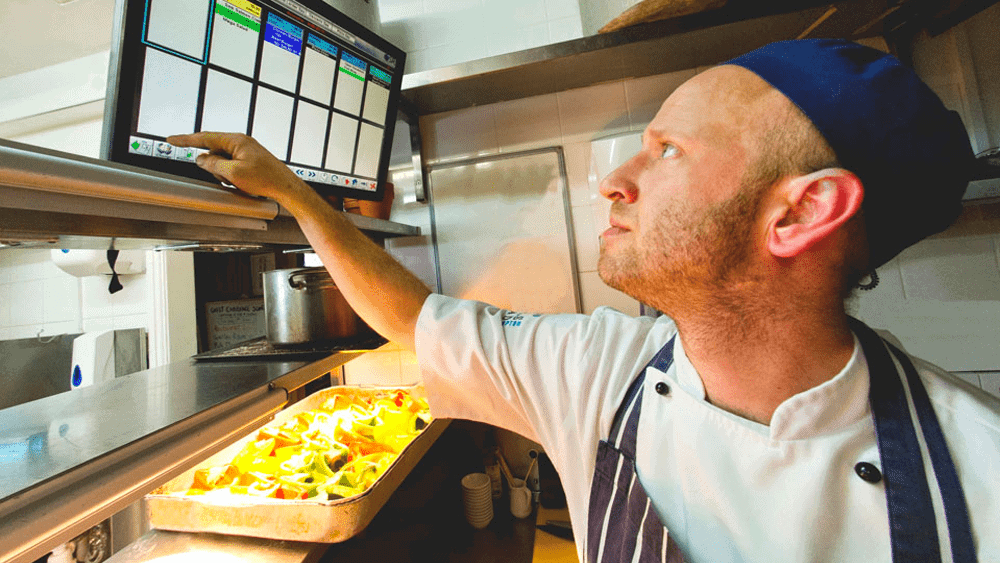
Hi. I’m Jeff Smith.
If you’re wondering What Does Expo mean in a Restaurant you’re in the right place.
In this article, we will cover that question in great detail. So, what does an expeditor do at a restaurant?
What makes someone good at this job?
With that said, how much money can you anticipate making from being an exhibitor?
Let’s take a look.
What does Expo mean in a restaurant?
What does Expo mean in a restaurant? A restaurant expo ensures that food gets from the kitchen to your table. The word “expeditor” refers to someone who works behind the scenes to guarantee that every meal arrives at its destination on time and in perfect condition.
What is the Expos Role in The Kitchen?
The Expo is often called a “first line of defense” because they have to ensure that food gets out on time and correctly. It’s their job to check tickets, ensure all steps are followed correctly, and the ticket goes out when it should.
What Does an Expo Do?
Expediting food takes skill and severe attention to detail. The Expo needs to be able to look at a ticket and know whether there are any problems with it (such as missing ingredients or incorrect quantities).
They must also know how long each step should take to track how long since each item was brought into the kitchen.
In addition, they need excellent communication skills because they’re managing several people at once: cooks who need help with recipes, servers who need help sending things out, managers who may want changes made, etcetera.
What Does Expo Mean in a Restaurant?
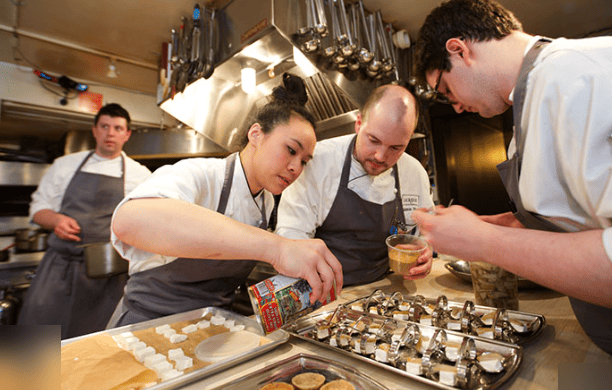
An expo or expediter is a restaurant staff member who oversees the preparation and serving of food.
Specifically, they act as the liaison between the kitchen staff and servers (or waitstaff) to ensure that orders are prepared at the right time and in the proper order.
The expediter will work directly with both sides to ensure each customer’s order is fulfilled correctly and efficiently.
As well as coordinating when food should be sent out, the expeditor also ensures that drinks are refilled, condiments are replenished, dirty dishes are cleared away—and all other tasks necessary for running a smooth operation.
An expeditor helps keep customers happy by managing these tasks efficiently by preventing long waits for their meals or beverages.
In addition to making customers happy with efficient service, this also frees up server time so that they can spend more time interacting with guests instead of waiting on tables or running around after things like empty glasses or dirty plates (something which some restaurants have resorted to hiring staff specifically for).
What makes a Good Restaurant Expeditor?
As a restaurant expeditor, you must be able to multitask and manage your time well. Additionally, you must maintain your composure under duress and be able to work effectively with others. Staying organized will help you handle the busy atmosphere of a restaurant efficiently.
How Much Do Expos Make?
You can make between $20,000 and $45,000 as an expo. The exact amount depends on your experience, location, and the restaurant you work at. You may be able to earn more than this if you have a degree in culinary arts or business or hospitality management.
Does Expo Get Tips?
Expo is a salaried position, so tips are not expected or required. If you feel compelled to tip your Expo after the meal, know they will benefit—but it’s up to you.
How to Become an Expeditor at a Restaurant

If you want to become an expeditor in a restaurant, there are a few steps you’ll need to take. First, take a course on restaurant management and learn about the ins and outs of running a business.
Next, look for opportunities at restaurants by looking at job postings online or asking around friends who may know of openings.
If you don’t find any jobs that fit your needs immediately, consider working in another aspect of the business—such as cooking or waitressing—to gain work experience before applying for more specialized positions like expediting.
Finally, when applying for an expediting position at a restaurant, ensure it’s what you’re interested in doing.
People will often be hired as servers because they lack experience with other options but then end up unhappy with their roles because they didn’t realize what they were getting into.
Is an Expeditor a Waiter?
The waiter is the restaurant’s face. The expeditor is at the back of the house, ensuring that food arrives promptly and all orders are correct.
The expeditor works closely with the chef and cooks to ensure that orders arrive on time and accurately. The expeditor also coordinates with servers when they bring food to tables. Hence, customers receive their meals as quickly as possible.
Can a Good Expeditor Boost Your Restaurant’s Business?
One of the essential roles in a restaurant is that of an expeditor. The best way to understand what an expeditor does is by looking at their role and responsibilities.
An expeditor keeps the kitchen running smoothly by managing orders, coordinating production, and communicating with other staff members.
They ensure food is delivered quickly and efficiently without compromising quality or taste. In short, they help keep up with demand so you can start making money.
If you’re thinking about hiring an expeditor for your business but aren’t sure if it’s worth it, consider this benefit:
You’ll be able to serve more customers faster—and get them out faster, too (which means more Profit).
What makes a Good Expeditor?
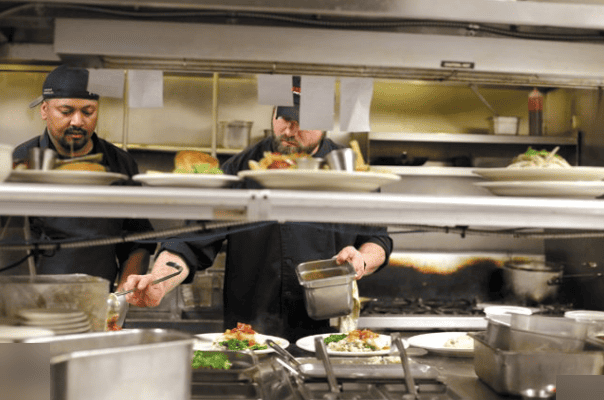
An expeditor is a restaurant employee who manages the flow of food from the kitchen to the dining room. This means they serve as gatekeepers for food and beverages, deciding what goes to each table and when someone should be seated.
It’s a demanding job requiring excellent communication, attention to detail, organization, time management, and problem-solving abilities.
A good expeditor should also possess good people skills; they need the interpersonal ability to work well with their coworkers (the chef), customers (waiters), and staff in general (busboys).
They need to be able to set an example and listen intently at the same time when others speak up about different ways of doing things at work or concerns regarding customer satisfaction levels.
In addition, multitasking abilities are essential since you will juggle many responsibilities simultaneously during your shift—like moving multiple carts full of dishes out onto busy restaurant floors simultaneously.
A good memory helps, too, because there is often much information stored inside your head about previous orders placed by specific customers, which needs access whenever possible during shifts, too.
Who is most likely to be the expediter in a kitchen?
If you’re unfamiliar with the term, an expo is a person who orchestrates the flow of food through a kitchen.
At its simplest, they make sure that whatever has been ordered is prepared and ready to be served when it’s supposed to be. They might coordinate deliveries from suppliers and pick-ups from local farms or purveyors in more complex kitchens.
They must ensure their chefs have everything they need—foodstuffs, equipment, and people—to prepare dishes on time.
How to expedite food in a Restaurant.

If you want to improve your food expediting skills, you can do a few things. First, you must learn how to read tickets correctly and quickly.
A good way of doing this is by practicing on your own with some practice tickets from home or work (if your restaurant provides them).
Once you’ve got the hang of reading tickets correctly, try moving on to more difficult ones—for example, tickets with incorrect or incomplete information.
Finally, take some time every day before starting your shift at the restaurant so that when it comes time for dinner service, you can make those orders happen ASAP.
What is a restaurant expeditor’s salary?
While the exact salary of a restaurant expo depends on where they work and their experience, it is generally around $30,000. The average salary for a restaurant expeditor is $40,000 annually in the United States.
Some higher-end restaurants can pay even more than that. Expeditors are responsible for getting food out of the kitchen and onto tables as quickly and efficiently as possible.
They also help keep track of what foods need to be prepared or cooked by observing how much food is left on each table before it’s ready for another round of orders from guests who want to eat at home after leaving the restaurant—also known as “carry out” or “takeout” orders.
Watch Why a Restaurant Expo Is Critical To Your Kitchen
Who Is a Restaurant Expeditor?

The expeditor is the person who assigns and times orders, checks food quality before it leaves the kitchen, coordinates the work of other kitchen staff, and resolves issues as they arise.
Expeditors are responsible for assigning orders to specific cooks and ensuring that the correct number of each item is prepared.
They also ensure that enough food items are always available so that no one has to wait more than five minutes for their order after it’s placed.
Finally, expeditors ensure that food is served in an organized fashion—no one wants to sit there twiddling their thumbs. At the same time, everyone else gets their meals first!
In addition to plate assembly, expeditors are responsible for assigning and timing orders, checking food quality before it leaves the kitchen, and coordinating the work of other kitchen staff.
They are also responsible for communicating with waiters about what is ready regarding orders.
Their role as leader/manager is to ensure that all stations operate efficiently by monitoring production times and keeping track of food used out of inventory.
Expediting is one of the most stressful jobs in restaurants because all other kitchen staff depend on you to get it right.
In a way, you’re the captain of your kitchen. If a ticket is open and the expediter doesn’t respond, someone else must take care of it until you tell them what to do.
Suppose a dish comes out late or not. In that case, that can be very stressful for everyone involved—the cook who prepared the food, the server who has to deliver it cold or missing ingredients or sauce, and especially for diners who wait longer than they should for their meal.
Expediting takes practice and experience but becomes second nature once you get good at it. Here are some ways an emergency menu change can affect your service:
Fewer runners may be available to help with specials just because they didn’t know beforehand.
Cooks might not know how long something takes in different pans (e.g., baking times). This could result in food being overcooked or undercooked regardless of how well-prepared they were beforehand.
While many restaurants require expeditors to have 2-3 years of prior experience or formal cooking training, some chefs teach expediting on the job.
These chefs have developed their style and methods for training, which may include hands-on guidance, demonstrations, and written instructions.
Additionally, some restaurants require aspiring cooks to develop their skills through an in-house program. These programs typically last about two weeks and involve culinary classes covering food safety and recipe preparation.
The Expo is an essential part of restaurant operation.
You likely won’t have the opportunity to work with an expo in your first few jobs, but knowing what they do is essential.
Expeditors are responsible for assigning and timing orders, checking food quality before it leaves the kitchen, and coordinating the work of other kitchen staff.
It may seem to be a lot of responsibility, but an efficient and organized expo is essential for smooth operation in any restaurant.
Frequently ASKED Questions
What Is an Expo Line in a Kitchen?
An expo line in a kitchen refers to the role of an expeditor who maintains consistent communication between the dining room and the kitchen in the restaurant.
What Does Expo Mean in a Job?
In the restaurant context, an “Expo” refers to a food expeditor or runner. This role acts as a bridge between the kitchen staff and the customers. The efficiency and effectiveness of an expo are critical as customer contentment largely hinges on their performance.
What Is Another Name for Expo in a Restaurant?
An “Expo” is also called an “Expeditor” in a restaurant. This individual interprets orders for the kitchen using the ticket, verifies the correctness of plated dishes, and ensures timely delivery of meals. They act as a communication link between the front and back of the establishment.
Is Expo Front or Back of House?
The expo operates at the intersection of the front-of-house and back-of-house, primarily aligning with the front-of-house operations.
Is Expo and Food Runner the Same?
The runner/expo is a vital link between the kitchen and the patrons. This role involves constant movement to ensure dishes are finalized in the kitchen and swiftly and precisely delivered to the guests. They describe the served food and handle or relay guest requests as they arise.
What Is an Expo Shift?
An Expo shift entails loading prepared food onto trays and ensuring delivery to the right tables. A garnish expo might assist the primary expo in garnishing and salad preparation in, especially bustling establishments. Key responsibilities of an expo include verifying order accuracy and adding garnishes to hot food.
Is Expo Important in a Restaurant?
Indeed, a food expeditor, commonly called “Expo,” is indispensable in a restaurant setting. They coordinate food orders, ensure timely and accurate delivery, and play a pivotal role in sustaining organization and efficiency within the kitchen.
Conclusion – What Does Expo Mean in a Restaurant
In summary, it is the job of the Expo to ensure that your food arrives at the table promptly. This requires thinking quickly, solving problems, and dealing with unexpected situations. An expeditor needs to be able to keep his cool when things get hectic to maintain his composure and keep everyone else on track.
Jeff Smith is a Restaurant Consultant with over 20 years of hospitality experience, from server to owner to general manager. He focuses on Restaurant POS technology as well as restaurant marketing. Check out our world-famous restaurant resources page for a comprehensive offering of hand-picked resources and tools to help your business. You can also check out some of our other restaurant business articles.



